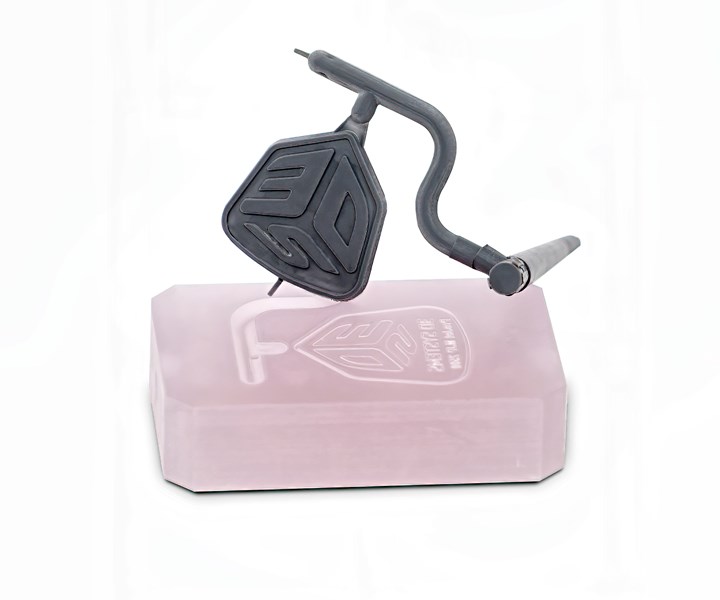Tooling: Heat-Resistant 3D Printing Material Suited to Plastic Tooling
A tough, heat-resistant resin for 3D printing was introduced last November by 3D Systems.
A tough, heat-resistant resin for 3D printing was introduced last November by 3D Systems. It was touted for its strength, rigidity and especially its “best-in-class” heat-deflection temperature around 90 C (194 F), as well as its biocompatibility (meeting USP Class VI 93 standards) and ability to reproduce ultra-sharp details. Now, the company is promoting this VisiJet M2S-HT90 as “the first in a new line of advanced specialty materials for indirect manufacturing”—including jigs, fixtures and plastic tooling inserts for processes such as thermoforming and injection molding. According to the company, small mold inserts can be produced in a few hours for around $100 or less.

Injection mold insert 3D printed in 3D Systems’ VisiJet M2S-HT90.
Suited for the MultiJet 3D printing process (analogous to inkjet printing), this acrylic-based resin is cured by UV light and needs no postcure. It cures to “water-clear” transparency.
For thermoforming tool inserts, M2S-HT90 can be deposited with an easily removable wax support to produce a porous lattice structure and built-in vacuum holes (no need for drilling). In thermoforming trials, shallow-draw parts were formed on these inserts with no noticeable degradation after 100 cycles.
In injection molding trials, PP parts were molded using 3D printed tool inserts at 176 C (349 F) with 250 psi barrel pressure and 1800 psi core pressure. Ten to 15 parts were printed successfully. 3D Systems says M2S-HT90 can withstand molding of resins such as PP, PC, ABS, PVC and PMMA (acrylic) at 140-200 C (284-392 F), and the inserts are resilient enough to be bolted to the mold base (ultimate elongation is 4-9%).
Other potential applications include tools for RTV silicone molding and for sheet-metal forming at up to 15 tons of force (withstanding 100 cycles in testing).
Related Content
-
How To Design Three-Plate Molds – Part 4
There are many things to consider, and paying attention to the details can help avoid machine downtime and higher maintenance costs — and keep the customer happy.
-
Hot Runners: Truths. Myths, Overlooked Areas: Part 2
Here’s a view from the trenches of a tooling manager who, over 30 years, has experienced the joys and pains of using virtually every type of hot runner on the market. Part 2.
-
How to Design Three-Plate Molds: Part 5
There are many things to consider, and paying attention to the details can help avoid machine downtime and higher maintenance costs. In this installment, the focus is on design and placement of sucker/puller pins.
















